Recent midterm U.S. elections saw Republicans win control of the House of Representatives with a promise to reduce the trillion-dollar federal deficit and stop adding to America's $14-trillion national debt. Republicans have pledged to accomplish this feat through spending cuts alone, saying they will oppose any tax increases on any segment of the population.
This means, beginning in January, when the new Congress convenes, President Obama will have to deal with a more fiscally conservative legislature, one that is unlikely to act on his call to allow temporary tax cuts for top earners to expire.
Virginia Republican Congressman Eric Cantor is expected to become House Majority Leader next year.
"I am not for raising taxes in a recession, especially when it comes to job-creators that we need so desperately to start creating jobs again. Washington does not have a revenue problem. It has a spending problem."
Cantor spoke on Fox News Sunday.
Rather than allowing taxes to go up, Republicans say they will cut spending. Kentucky Senator-elect Rand Paul, who belongs to the so-called "Tea Party" faction of the Republican Party, outlined ways to trim the federal budget on ABC's This Week program.
"I would freeze federal hiring. I would maybe reduce federal employees by 10 percent. I would probably reduce their wages by 10 percent.”
Paul also called for cuts in defense spending and a restructuring of America's entitlement programs, like Social Security and government-provided medical insurance for senior citizens.
But those measures are not enough to put America's fiscal house in order, according to David Stockman, former budget director under President Ronald Reagan. In the 1980s, Stockman was a key advocate for low taxes as a means of stimulating economic growth, which, he argued, would close revenue gaps.
Today, Stockman says America's fiscal imbalances cannot be corrected without a combination of aggressive spending cuts and substantial tax increases.
"When you raise the rates, you get more revenue. Normally, [tax increases] are a bad thing to do. But we are in such dire shape that we have no choice but to accept the negative trade-off of some harm to the economy to start paying our bills," says Stockman.
Not so, according to Indiana Republican Congressman Mike Pence, who also appeared on This Week.
"I do not think higher taxes are going to get anybody hired. I think raising taxes in the worst economy in 25 years is a profoundly bad idea," claims Pence.
President Obama has proposed a freeze on federal spending other than national defense and entitlement programs. He has also indicated a willingness to extend all tax cuts temporarily with the stipulation that income tax rates for the wealthiest Americans would go up at a later date. So far, Republicans have shown no willingness to compromise on the tax issue.
Republicans Say Spending Cuts Key to Reducing US Deficit




